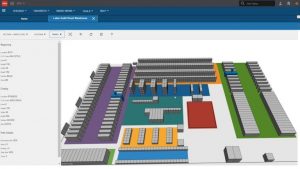Revolutionizing Supply Chains: Warehouse Management Solutions and Logistics Software in India

In the dynamic and rapidly evolving landscape of supply chain management, the role of technology has become increasingly crucial. Warehouse management solutions (WMS) and logistics software have emerged as game-changers, reshaping the way businesses handle their inventory, streamline operations, and optimize logistics processes. In India, a burgeoning economy with a robust manufacturing and retail sector, the adoption of these innovative technologies is gaining momentum.
Warehouse Management Company in India – Suraj Informatics is one of the leading Warehouse Management Companies in India that offers warehouses and inventory management logistics software.

I. The Need for Advanced Warehouse Management Solutions:
A. Rising Complexity of Supply Chains:
- Globalization and increased trade volumes have led to more complex supply chains.
- Businesses face challenges in managing diverse inventory, multiple suppliers, and varying demand patterns.
B. Efficiency and Accuracy:
- Manual processes are prone to errors and inefficiencies, leading to increased operational costs.
- Real-time tracking and automation are essential for accurate inventory management and order fulfillment.
II. Key Features of Warehouse Management Solutions:
A. Inventory Tracking and Visibility:
- RFID and barcode technologies for accurate and real-time tracking.
- Enhanced visibility into inventory levels, reducing the risk of stockouts or overstock situations.
B. Order Fulfillment Optimization:
- Automated order picking and packing processes for increased efficiency.
- Integration with e-commerce platforms to streamline online order fulfillment.
C. Data Analytics for Decision-Making:
- Predictive analytics to forecast demand and optimize inventory levels.
- Data-driven insights for strategic decision-making and continuous improvement.
III. Logistics Software Transforming the Last Mile:
A. Route Optimization:
- GPS and geospatial technologies to optimize delivery routes.
- Reducing fuel consumption and improving delivery timelines.
B. Real-Time Tracking:
- GPS-enabled tracking for real-time visibility of shipments.
- Enhancing customer satisfaction through accurate delivery updates.
C. Collaborative Platforms:
- Platforms that connect various stakeholders in the supply chain for seamless communication.
- Improved coordination among suppliers, manufacturers, and distributors.
IV. Adoption Trends in the Indian Market:
A. E-commerce Boom:
- The exponential growth of e-commerce in India is driving the need for efficient warehouse and logistics solutions.
- Companies are investing in technology to meet the demands of the digital consumer.
B. Small and Medium Enterprises (SMEs):
- Increasing adoption of WMS and logistics software among SMEs to compete with larger players.
- Cost-effective solutions catering to the specific needs of smaller businesses.
V. Challenges and Future Prospects:
A. Integration Challenges:
- Overcoming the challenge of integrating WMS and logistics software with existing systems.
- The need for seamless data flow across the entire supply chain.
B. Emerging Technologies:
- The role of emerging technologies like artificial intelligence, machine learning, and the Internet of Things in shaping the future of supply chain management.
- Continuous innovation for sustainable and efficient supply chain practices.

Conclusion:
As the Indian supply chain landscape continues to evolve, the adoption of warehouse management solutions and logistics software is no longer a luxury but a necessity for businesses aiming to thrive in the competitive market. The journey toward a smarter, more efficient supply chain is underway, and the integration of technology is pivotal in driving success and meeting the demands of an ever-changing market.
